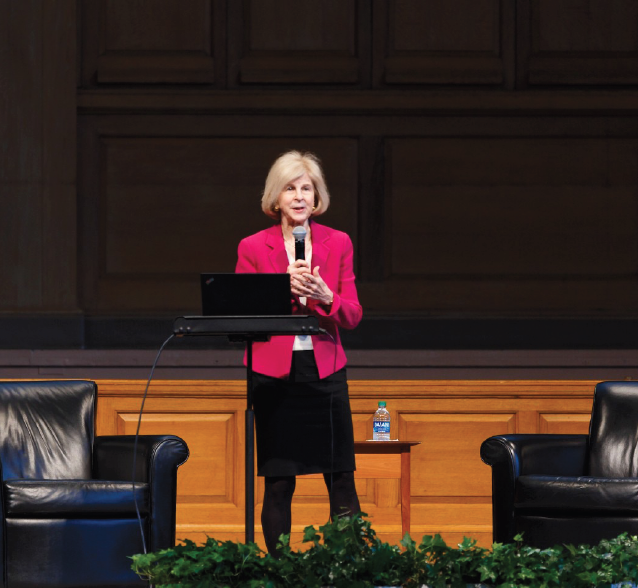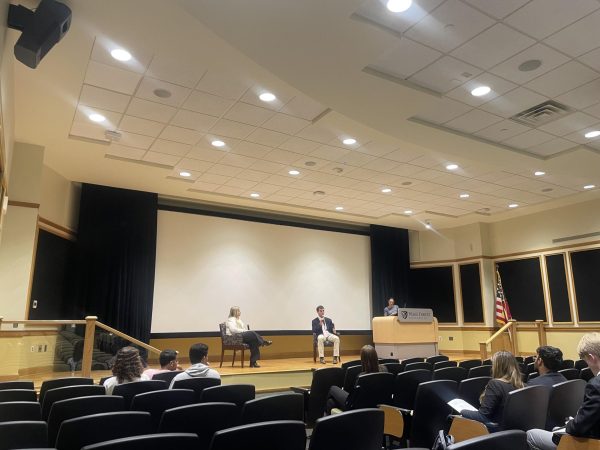Elaine Pagels delivers ‘Why Religion’ lecture
Pagels, an award-winning author, speaks on how tragedy inspired her religious journey
Courtesy of the School of Divinity
A historian of religion and professor at Princeton University, Pagels’ research focuses on Gnosticism and early Christianity.
April 6, 2022
Hosted by the Wake Forest School of Divinity, Dr. Elaine Pagels delivered a lecture on March 31 in Wait Chapel about her experience with the Gnostic gospels and the freedom those texts offered her in the face of tragedy.
Pagels is a religion professor at Princeton University, a National Book Award winner and a New York Times bestselling author. Pagels’ talk was based on her book “Why Religion?: A Personal Story”. The memoir focuses on her experience losing her husband and young child while also wrestling with questions about religion’s role in everyday life. Differing from her more academic works on Gnosticism and early Christianity, this book uses personal reflection to answer bigger questions about why people are religious and how belief presents itself in people’s lives.
The talk was the first in the Strickland Series, an initiative that invites religious scholars to present on campus. The series was established in 2021 by Elizabeth Strickland in honor of her late husband, Robert Strickland, to continue his commitment to theological education at Wake Forest.
In her lecture, Pagels weaved together her knowledge of the Gnostic or “secret” gospels — Christian texts that are not a part of the Biblical canon — with her personal experience with Christianity to explain the importance of these noncanonical texts.
“Many of us who do academic research and academic publishing are certainly driven by our own questions and our own experiences, but we don’t often talk about it in a personal way,” Associate Professor of New Testament at the Wake Forest School of Divinity Katherine Shaner said. “When academics like Professor Pagels do speak about their personal lives and experiences alongside the way they do their academic work, I think it only strengthens their academic work. It gives it a context, and it helps people make meaning with things that could seem a bit esoteric.”
Pagels began her lecture by recounting how she became Christian even though her parents did not support religion. She joined the evangelical church after attending a Billy Graham crusade and feeling as if she gained “another dimension of experience.”
Pagels touched on how she left the Evangelical Church after a year because she felt that they were more focused on doctrine than the love of God. This led her to explore Christianity further in her studies at Harvard, where she became infatuated with the Gnostic gospels, which focus more on how we experience life and less on what we believe.
“For me, it was liberating to not focus on a set of doctrines I had to believe in,” Pagels said in her lecture.
The liberation Pagels found in the secret gospels allowed her to find meaning again after losing both her child and husband. Through her connection with the secret gospels and its focus on the connection between all people, she was able to think more critically about how to experience religion in more diverse ways.
Pagels explained that looking at texts such as the secret gospels can allow people to explore more diverse Christian views that are not necessarily present in the traditional Biblical canon, which focuses more on a unified Christianity. She believes that identifying Christianity as a set of things one needs to believe in is limiting to how people experience religion.
“One of the trends in the past 30 years in mainline Protestant churches is a decline in participation, but one of the things we haven’t seen is a decline in the need for meaning-making or some kind of spiritual fulfillment,” Shaner said. “Even if the church as we know it isn’t meeting the needs of people, the needs are still there.”
Pagels ended her lecture by highlighting the need for critical thinking as well as new and diverse views in religion, especially within Christianity, as people’s spiritual needs evolve and demand more than what is offered in traditional religious settings.
“To hear her own synopsis of her book and to hear her voice her journey was helpful to apply the healing, meaning and belonging that religion brings,” third-year divinity student Ellen Snow said. “Dr. Pagels affirmed through her own story that religion has no limit to what can be learned from it, and in turn, what can be learned about ourselves, humankind and the world.”






















